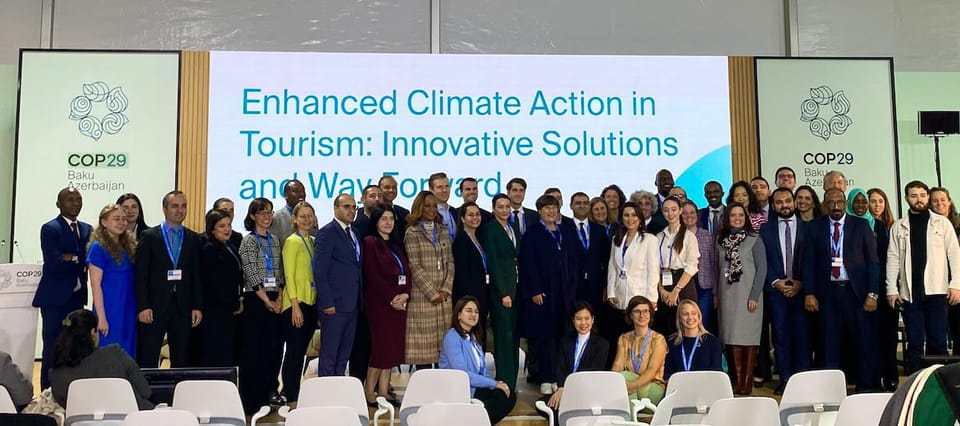The first day dedicated to Tourism within the framework of the Conference of the Parties to the UNFCCC (COP / Climate Change) took place on November 20, 2024, at COP29 in Baku, Azerbaijan. This means that the high-level tourism agenda has become embedded in the international environment and climate change agenda. The first is a young freshman. The second, a veteran precursor of movements in favor of sustainable development, since the middle of the twentieth century, with growing international engagement.
Tourism now has a seat, voice, rights and duties in the construction of a present and a future in more harmony between humans and nature. The responsibility increased. Leaders from all continents met in Baku to discuss a climate agenda for tourism, with ambitious commitments aimed at the challenges and opportunities of the sector. It was a memorable day, of reinvigorated optimism about our future.
In the case of tourism and international relations professionals in Brazil, in which I include myself, this responsibility is even greater. As the host of COP30, Brazil will set the priority agenda of the Conference. In the case of the Thematic Day of Tourism, the Ministry of Tourism should work together with the UN Tourism to continue the negotiations started in Baku, in addition to deepening them and providing new proposals and strategies.
What is Brazil's position in the global discussion of climate change and tourism? How has tourism in Brazil acted in relation to climate change? Public and private sectors, how do they discuss and act in the light of the theme?
The discussions are at an early stage in Brazil. There are cases of excellence in the country, more in the private than in the public sphere. But they are far from being sufficient, or transformative. There is a need for tourism leaders to accelerate the pace, not only but especially in Brazil.
I had the privilege of participating in the "UN Climate Change COP 29 Tourism Thematic Day". In the photo, my wide smile represents a lot. The integration of tourism into the main international agendas has always guided me professionally. I traveled at the invitation of UN Tourism , whom I thank very much for the opportunity.
I summarize the main reflections, uncomfortable but optimistic:
- Measuring, decarbonizing, adapting, regenerating, financing and innovating were the main verbs at the discussion and negotiation tables. None of them are simple to implement, but all of them need urgent action.
- The co-creation of solutions is the way. The climate crisis is serious, complex and impacts everyone. Solutions need speed in their co-creation and implementation.
- Collaboration needs to happen at the local, national, regional, and global levels. Those who emit and those who are most impacted are not necessarily in the same place, or act in the same proportions. Partnerships, between public and private, local and global, have never made more sense, especially in support of the most vulnerable regions and communities. This is also part of climate justice.
- Perfection is less important than speed. There is no more time for discussions about the best paths. Science has already indicated challenges and pointed to necessary changes in course for decades. From now on, it's about directing the bow of the boat and rowing, all in the same direction and at the highest possible speed.
- The adoption of the Baku Declaration for Strengthening Climate Action in Tourism (or just the Baku Declaration) is an important step towards prioritizing the theme in public tourism policies and public investments. Although this Declaration is voluntary, it provides measures for the decarbonization of tourism, integrating them into the Nationally Determined Contributions (NDCs) of the Paris Agreement, which are compulsory. More than 50 countries signed the document, including Brazil.
- Systemic and transformative changes are needed in order to rapidly reduce emissions from tourism, which are incredibly growing and robust. Promoting solutions to reduce emissions, as well as offset them, is essential and urgent.
- It is important to revisit the allocation of resources, human, energy and financial. One way for decision-makers is to ask themselves the question: does directing current investments solve the problem, or deepen it? Deepening knowledge among teams, transitioning to an energy matrix with low or very low emissions of polluting gases, and implementing a circular economy are immediate, although complex, actions.
- The Glasgow Declaration for Climate Action in Tourism, whose 900 signatories commit to publishing their climate action plans annually, was highlighted in Baku with 58 new signatories announced. Despite the progress, further enhancements and global participation, especially from governments, are needed to promote Glasgow as a mechanism for shared collaboration and learning.
- While the Glasgow Declaration has a greater focus on service providers, the Baku Declaration is targeted at countries and their central tourism bodies. They are complementary and integrated into the same context in the UN Tourism .
- The UN Tourism coordinates the matrix for measuring sustainability indicators and climate actions in tourism, UN Statistical Framework for Measuring the Sustainability of Tourism . More collaboration is needed to improve the tool, and increasingly carbon measurements.
Brazilian leaders have the privilege and responsibility to continue the tourism climate agenda globally. It is possible to be inspired by the Brazil's leadership on environmental issues. It is always important to remember that the United Nations Framework Convention on Climate Change (UNFCC) was signed in Rio de Janeiro in 1992, which gave rise to the Kyoto and Paris protocols, from which the COPs and NDCs take place.
Will Brazilian tourism be able to be a leader? I vote and I hope so! It's about our future on Earth, first and foremost.


